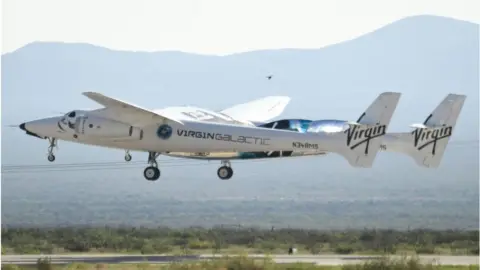Virgin Galactic delays first commercial space flight
 Getty Images
Getty ImagesShares in Virgin Galactic dived as much as 20% on Friday after the space tourism company said it was postponing its first commercial flight.
The trip was scheduled for the third quarter of 2022, but will be delayed until the fourth as the firm conducts repairs and upgrades.
It also said it will not conduct a second planned test flight this year.
Virgin is in a race with Jeff Bezos' Blue Origin and Elon Musk's Space X to start flying tourists into space.
In a statement the firm said a planned upgrade programme, aimed at enhancing the durability of its ships, would begin a month later than planned.
It comes after routine tests revealed "a possible reduction in the strength margins of certain materials" used on its VMS Eve and VSS Unity craft.
Virgin said this required further inspection but played down safety concerns.
"While this new lab test data has had no impact on the vehicles, our test flight protocols have clearly defined strength margins, and further analysis will assess whether any additional work is required to keep them at or above established levels," said company boss Michael Colglazier.
Space race heats up
The company, founded by British billionaire Richard Branson, said its next test flight - Unity 23 - would now happen next summer. Commercial flights will start after that.
Last month, the US Federal Aviation Administration lifted a no-fly order on Virgin Galactic after a flight in July deviated from assigned airspace on its descent.
The regulator had accused the company of not providing the necessary information about the flight in which Mr Branson participated.
On Wednesday, Hollywood actor William Shatner became the oldest person to go to space as he blasted off aboard the Blue Origin sub-orbital capsule developed by billionaire Amazon founder Jeff Bezos.
Meanwhile, four amateur astronauts blasted off from Florida on their private mission on one of Space X's Dragon spacecraft in September.
